Related Research Articles

Tamil literature refers to the literature in the Tamil language. Tamil literature has a rich and long literary tradition spanning more than two thousand years. The oldest extant works show signs of maturity indicating an even longer period of evolution. Contributors to the Tamil literature are mainly from Tamil people from South India, including the land now comprising Tamil Nadu, and the Sri Lankan Tamils from Sri Lanka, as well as the Tamil diaspora.
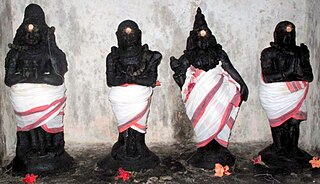
Thirumurai is a twelve volume compendium of songs or hymns in praise of Shiva in the Tamil language from the 6th to the 11th century by various poets in South India. Nambi Andar Nambi compiled the first seven volumes by Appar, Sampandhar and Sundarar as Tevaram during the 12th century. During the course of time, a strong necessity was felt by scholars to compile Saiva literature to accommodate other works. Tiruvasakam and Tirukovayar by Manickavasagar are included as the eighth, nine parts are compiled as the nineth Tirumurai out of which most are unknown, and the tenth as Tirumandiram by Tirumular, the famous Siddhar. The eleventh is compiled by Karaikal Ammaiyar, Cheraman Perumal and others. The contemporary Chola king was impressed by the work of Nambi and included Nambi's work in the eleventh Tirumurai. Sekkizhar's Periya Puranam, composed a century later, contains the life depiction of all the 63 Nayanmars. The response for the work was so tremendous among Saiva scholars and Kulothunga Chola II that it was included as the 12th Tirumurai. Tirumurai along with Vedas and Saiva agamas form the basis of Saiva Siddantha philosophy in Tamil Nadu.
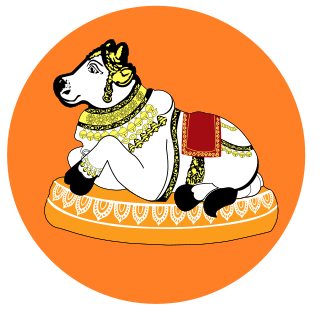
The Nayanars were a group of 63 saints living in Tamil Nadu during the 6th to 8th centuries CE who were devoted to the Hindu god Shiva. Along with the Alwars, their contemporaries who were devoted to Vishnu, they influenced the Bhakti movement in early medieval South India. The names of the Nayanars were first compiled by Sundarar. The list was expanded by Nambiyandar Nambi during his compilation of material by the poets for the Tirumurai collection, and would include Sundarar himself and Sundarar's parents.
The Nanneri (நன்னெறி) is a Tamil poem containing forty stanzas (Venpaas), written by Siva Prakasar, who lived during the late 17th and early 18th centuries.
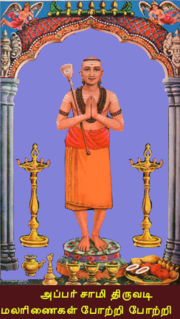
Appar Tirunavukkarayar Nayanar(Tamil: திருநாவுக்கரையர்Tirunāvukkarayar King of the Tongue, Lord of Language"), also known as Navukkarasar and Appar "Father", was a seventh-century Śaiva Tamil poet-saint, one of the most prominent of the sixty-three Nayanars. He was an older contemporary of Thirugnana Sambandar. His birth-name was Marulneekkiyar. He was called "father" by Sambandar, hence the name Appar.
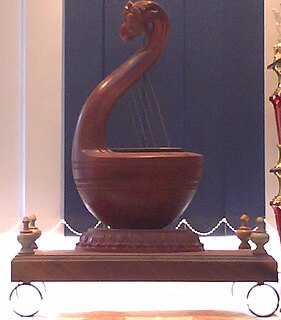
The ancient Tamil music is the historical predecessor of the Carnatic music during the Sangam period 500 BCE - 200CE.

Professor A. Dakshinamurthy is an eminent Tamil scholar, writer, and an English translator of classical, medieval and modern Tamil literature. He is a pioneer in the field of translation of Classical Tamil works. He is best known for his complete and faithful English translations of 19 ancient classical Tamil literature for the very first time in history between the period of 1999-2012. The Government of India honored him with the Presidential Award for lifetime achievement in Classical Tamil, 'The Tolkappiyar Award' for the year 2015.
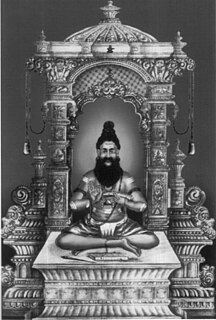
Siva Prakasar, was a Tamil poet and philosopher lived during the late 17th and early 18th centuries. He was called 'Thurai mangalam Sivaprakasar', 'Karpanai Kalangiyam', 'Sivanuputhi chelvar'. He had contributed more than Thirty four Thamizh books for the Thamizh Literature, the most well known of which is the Nanneri, a work dealing with moral instruction. He is also well known for translating early Kannada works into the Tamil language. and for creating his own poetry.
Velaiya Swamigal, also called Velaiyar, born during the seventeenth century, was a Saivaite spiritual writer. He was born to a Tamil-speaking Desikar family in Kanchipuram, Tamil Nadu. He compiled more than seven books.

Swaminatha Desikar "Susai", born Swaminatha Desikar, was a spiritual writer. He was born from a Tamil-speaking Desikar family in Valavanur, Tamil Nadu. He compiled three books in Tamil.
Karunai Prakasar was a seventeenth century Saiva spiritual writer. He was born to a Tamil-speaking Desikar family in Kanchipuram, Tamil Nadu. He wrote more than five books. He was a spiritual writer. He worshipped Saiva Siddantha. He got married when he was sixteen. He attained Mukthi Motcha at the age of eighteen. Therefore, he had no children.
Kumara Swamy Desikar, was a Saiva spiritual writer. He was born to a Tamil-speaking Desikar family in Kanchipuram, Tamil Nadu. He composed more than three books.
Sundaresa Desikar is a spiritual writer. He was born to a Tamil-speaking Desikar family from Mailam and settled down at Valavanur, Tamil Nadu.
Naalvar Nanna Mani Maalai in Tamil நால்வர் நான்மணி மாலை written by Siva Prakasar, who is also known as ‘Siva anuputhi selvar, ‘Karpanai Kalangiyam’, ‘Thurai mangalam Sivaprakasar'. It is also one among the literary works by Sivaprakasa swamigal.
The Yesu Matha Niragaranam is a Tamil tract against Christianity, written by Siva Prakasar. The book includes brief examples and analogies. It is a classic instance of a clash between a Semitic religion and an oriental tradition. The concept of karma and sin have crossed in the debate.
Santhalinga Swamigal (Santhalingam) was a Saiva spiritual writer in Perur, known as West-Chidambaram, Tamil Nadu. Santhalinga swamigal was born to a Tamil-speaking family. That village is called Perur in Tamil Nadu, South India into an orthodox Saiva Tamil family around the middle of the 17th century.
The Prabhu Linga Leelai Venpaas in Tamil written by Siva Prakasar also called as 'Siva anuputhi selvar, 'Karpanai Kalangiyam', 'Thurai mangalam Sivaprakasar'. He compiled more than thirty original works and few more translation works from Kannada and Sanskrit.
The Sivaprakasa Visagam is a collection of Poems in Tamil written by Siva Prakasar. Shaiva Siddhanta.
Tiruvalluva Maalai, literally 'Garland of Valluvar', is an anthology of ancient Tamil paeans containing fifty-five verses each written by different poets praising the ancient work of the Kural and its author Valluvar. With the poets' time spanning across centuries starting from around 1st century CE, the collection is believed to have reached its present form by 11th century CE. With the historical details of the ancient philosopher and his work remaining obscure, much of the legend on the Kural and Valluvar as they are known today are chiefly from this work. The collection also reveals the name of the author of the Kural text as 'Valluvar' for the first time, as Valluvar himself composed the Kural text centuries earlier without indicating his name anywhere in his work. Reminiscing this, Monsieur Ariel, a French scholar of the 19th century, famously said of the Tirukkural thus: Ce livre sans nom, par un autre sans nom.
References
- ↑ "tamil/tamil_lite". lisindia.net. Retrieved 24 October 2014.
- ↑ "Koha Error". connemara.tnopac.gov.in. Retrieved 24 October 2014.
- ↑ "Sona Saila Malai - சோண சைல மாலை ( திருவண்ணாமலை மீது பாடப்பெற்றது)". shaivam.org. Retrieved 24 October 2014.
- ↑ "Sona Saila Maalai". ramana-maharshi.info. Retrieved 24 October 2014.
- ↑ "SONG GARLAND TO THE RED MOUNTAIN (ARUNACHALA) - The Hinduism Forum - IndiaDivine.org". indiadivine.org. Retrieved 24 October 2014.
- ↑ Barnett, L.D.; Pope, G.U. (1995). Catalogue of the Tamil Books in the Library of the British Museum. Laurier Books, Limited. p. 371. ISBN 9788120610002 . Retrieved 24 October 2014.